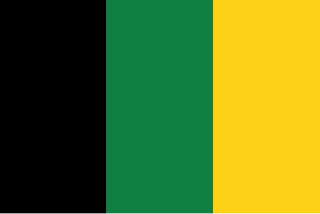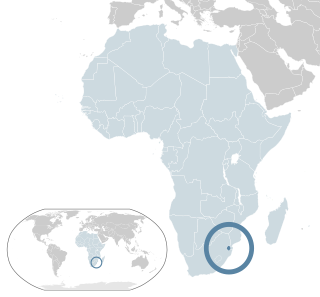
Eswatini, officially the Kingdom of Eswatini and formerly named Swaziland, is a landlocked country in Southern Africa. It is bordered by Mozambique to its northeast and South Africa to its north, west, south, and southeast. At no more than 200 kilometres (120 mi) north to south and 130 kilometres (81 mi) east to west, Eswatini is one of the smallest countries in Africa; despite this, its climate and topography are diverse, ranging from a cool and mountainous highveld to a hot and dry lowveld.

Eswatini is an absolute monarchy with constitutional provisions and Swazi law and Custom. The head of state is the king or Ngwenyama, currently King Mswati III, who ascended to the throne in 1986 after the death of his father King Sobhuza II in 1982 and a period of regency. According to the constitution of Eswatini, the king and Ingwenyama is a symbol of unity and the eternity of the Swazi nation. By tradition, the king reigns along with his mother or a ritual substitute, the Ndlovukati. The former was viewed as the administrative head of state and the latter as a spiritual and national head of state, with real power counterbalancing that of the king, but during the long reign of Sobhuza II the role of the Ndlovukati became more symbolic. The king appoints the prime minister from the legislature and also appoints a minority of legislators to both chambers of Libandla (parliament), with help from an advisory council. The king is allowed by the constitution to appoint some members to parliament for special interests. These special interests are citizens who might have been left out by the electorate during the course of elections or did not enter as candidates. This is done to balance views in parliament. Special interests could be people of gender, race, disability, business community, civic society, scholars, chiefs and so on. The Senate consists of 30 members, of which some are appointed by the king on recommendation of the advisory council and others elected by the lower house. The House of Assembly has 65 seats, 55 of which are occupied by elected representatives from the 55 constituencies around the country, and 10 of which are appointed by the king on recommendation of the advisory council; the attorney general is the ex-officio member. Elections are held every five years.
The Umbutfo Eswatini Defence Force (UEDF) is the official armed national military of the Southern African Kingdom of Eswatini (Swaziland). It is used primarily during domestic protests, with some border and customs duties; the force has never been involved in a foreign conflict. The army has struggled with high rates of HIV infection. Since measures were put in place the rate is dropping.

Artifacts indicating human activity dating back to the early Stone Age have been found in the Kingdom of Eswatini. The earliest known inhabitants of the region were Khoisan hunter-gatherers. Later, the population became predominantly Nguni during and after the great Bantu migrations. People speaking languages ancestral to the current Sotho and Nguni languages began settling no later than the 11th century. The country now derives its name from a later king named Mswati II. Mswati II was the greatest of the fighting kings of Eswatini, and he greatly extended the area of the country to twice its current size. The people of Eswatini largely belong to a number of clans that can be categorized as Emakhandzambili, Bemdzabu, and Emafikamuva, depending on when and how they settled in Eswatini.

Mswati III is the king of Eswatini and head of the Swazi royal family. He was born in Manzini in the Protectorate of Swaziland to King Sobhuza II and one of his younger wives, Ntfombi Tfwala. He was crowned as Mswati III, Ingwenyama and King of Swaziland, on 25 April 1986 at the age of 18, thus becoming the youngest ruling monarch in the world at that time. Together with his mother, Ntfombi Tfwala, now Queen Mother (Ndlovukati), he rules the country as an absolute monarch. Mswati III is known for his practice of polygamy and currently has 15 wives.

The Parliament of Eswatini is bicameral, consisting of a lower chamber and an upper one. Some of the members of both chambers are elected, while the rest are appointed by the King of Eswatini. Election is by secret ballot in a first-past-the-post system of voting. Members of both chambers serve for five-year terms. All candidates run on a non-partisan basis, as political parties are banned.

The Ngwane National Liberatory Congress (NNLC) is a political party in Eswatini. It was founded on 12 April 1963 as a breakaway party from the Swaziland Progressive Party (SPP) led by Dr. J. J. Nquku.

The People's United Democratic Movement is the largest opposition party in Eswatini. It is a democratic socialist party. Formed in 1983 at the University of Eswatini, it is led by Mlungisi Makhanya. The Swazi government has been monitoring PUDEMO closely since it launched the Ulibambe Lingashoni campaign, which aims for a "total liberation" of Eswatini, and has recently cracked down heavily on even small manifestations of support for PUDEMO, such as the death in custody of PUDEMO member Sipho Jele, who was arrested for wearing a PUDEMO t-shirt in May 2010.

The House of Assembly of Eswatini is the lower chamber of the country's bicameral Parliament. The Assembly may debate and pass bills.

In Eswatini, an inkhundla is an administrative subdivision smaller than a district but larger than an umphakatsi. There are 55 tinkhundla in Eswatini: 14 in Hhohho District, 11 in Lubombo District, 16 in Manzini District, and 14 in Shishelweni District. According to the constitution of Eswatini, the government for Eswatini is a democratic, participatory, tinkhundla-based system that emphasizes devolution of state power from central government to tinkhundla areas and individual merit as a basis for election or appointment to public office. The system is non-partisan since the constitution does not recognize political parties, although section 25 of the constitution allows for open freedom of assembly and association. Each inkhundla elects one representative to the House of Assembly of Eswatini, the lower chamber of the bicameral parliament (Libandla). The same trend is applied in local government elections. This governing system was designed by King Sobhuza II with the assistance of political scholars and lawyers. It came to effect in 1978 and was adjusted in the early 1990s.

Ngwenyama is the title of the male ruler (King) of Eswatini. The Ngwenyama is the counterpart of the Ndlovukati. The Ndlovukati at certain times may serve as a Regent. The Ndlovukati is usually the Ngwenyama's mother.

Lesbian, gay, bisexual, and transgender (LGBT) rights in Eswatini are limited. LGBT people face legal challenges not experienced by non-LGBT residents. According to Rock of Hope, a Swati LGBT advocacy group, "there is no legislation recognising LGBTIs or protecting the right to a non-heterosexual orientation and gender identity and as a result [LGBT people] cannot be open about their orientation or gender identity for fear of rejection and discrimination". Homosexuality is illegal in Eswatini, though this law is in practice unenforced.

Eswatini, Africa's last remaining absolute monarchy, was rated by Freedom House from 1972 to 1992 as "Partly Free"; since 1993, it has been considered "Not Free". During these years the country's Freedom House rating for "Political Rights" has slipped from 4 to 7, and "Civil Liberties" from 2 to 5. Political parties have been banned in Eswatini since 1973. A 2011 Human Rights Watch report described the country as being "in the midst of a serious crisis of governance", noting that "[y]ears of extravagant expenditure by the royal family, fiscal indiscipline, and government corruption have left the country on the brink of economic disaster". In 2012, the African Commission on Human and Peoples' Rights (ACHPR) issued a sharp criticism of Eswatini's human-rights record, calling on the Swazi government to honor its commitments under international law in regards to freedom of expression, association, and assembly. HRW notes that owing to a 40% unemployment rate and low wages that oblige 80% of Swazis to live on less than US$2 a day, the government has been under "increasing pressure from civil society activists and trade unionists to implement economic reforms and open up the space for civil and political activism" and that dozens of arrests have taken place "during protests against the government's poor governance and human rights record".

Ambrose Mandvulo Dlamini was a Swazi business executive who served as the tenth prime minister of Eswatini, holding the office from October 2018 until his death on 13 December 2020.

The 2005 constitution is currently in force. The constitution of 6 September 1968 was suspended 12 April 1973 by a State of Emergency decree imposed by King Sobhuza II, the father of the current King Mswati III. The decree gave absolute power to the monarchy and banned organised political opposition to royal rule.

The Communist Party of Swaziland (CPS) is a Swazi communist party founded on 9 April 2011. It was banned by the Swazi king, Mswati III, shortly after its foundation, and operates clandestinely. The party is headquartered in Kamhlushwa, South Africa.

Government of the Kingdom of Eswatini is the union government created by the constitution of Eswatini where the monarch holds supreme executive, legislative, and judicial powers. The Ngwenyama (lion) is a hereditary leader, rules the country, with the assistance of a council of ministers and a national legislature.

Emaswati nationality law is regulated by the Constitution of Eswatini, as amended; the Swaziland Citizenship Act, and its revisions; and various international agreements to which the country is a signatory. These laws determine who is, or is eligible to be, a national of Eswatini. The legal means to acquire nationality, formal legal membership in a nation, differ from the domestic relationship of rights and obligations between a national and the nation, known as citizenship. Nationality describes the relationship of an individual to the state under international law, whereas citizenship is the domestic relationship of an individual within the nation. Emaswati nationality is typically obtained under the principle of jus soli, i.e. by birth in Eswatini, or jus sanguinis, born to parents with Emaswati nationality. It can be granted to persons with an affiliation to the country, or to a permanent resident who has lived in the country for a given period of time through naturalisation or the traditional khonta system.









